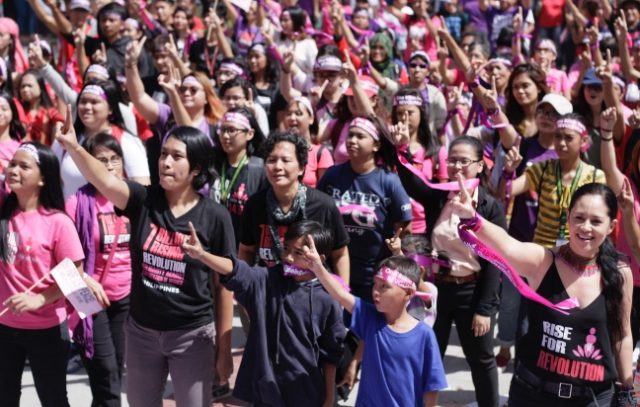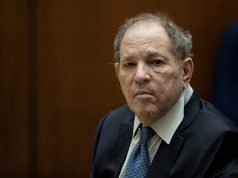
More and more these days, Filipino social media users are sharing their stories of sexual harassment and abuse under the hashtag #MeToo and calling attention to the need to raise “good men” who know right from wrong.
It was Hollywood actress Alyssa Milano who sparked the trend when she asked her Twitter followers at the weekend to write “me too” if they had also been sexually harassed or assaulted.
This was in the wake of a torrent of sexual abuse allegations against American film producer Harvey Weinstein, in incidents dating as far back as the 1980s.
In a #MeToo Facebook post, Annette Ferrer narrated her experience from high school. She was on her way home from school, accompanied by a household helper, when they saw a red Toyota Corolla parked near a McDonald’s that her schoolmates frequented.
“And then swings open the front door, a man touching himself, but his face hidden. He positioned his body just so, so his privates could hang out the car but the rest of his body couldn’t be seen,” she wrote.
“Yaya and I walked quickly away,” she continued.
They arrived home, only to find that her older sister, in medical school at the time, had experienced the same thing as she was walking home.
“It happened two more times. The second time, the man actually had a driver so the car moved slowly following Yaya and me. All the while, the door was open and he continued to touch himself. We hid temporarily in the McDonald’s nearby,” Ferrer said. “The third time, he had made it right by the corner of our house, at which point, my sister and I called the barangay police station, only to be asked by the officers, ‘What were you wearing then?'”
They were in their school uniforms.
“My sister slammed the phone on the officer, and we knew that we could not count on anyone but ourselves,” Ferrer wrote.
Mia Bontol recalled how, when she was 11 years old, she was in a cinema and a man sat beside her.
“An alarm goes off in your head as you realize he’s doing something terrible with his hand on his groin, his eyes on you,” she wrote on Facebook.
“It keeps ringing when you’re 16 in a bar and a guy ‘accidentally’ brushes his arm against your breasts four times,” she continued. “Through the years, anywhere you go, the same thing seems to happen to your butt, your legs, the most private of your parts – you’re 30, and you’re not sure if your body is truly yours.”
Also on Facebook, Ara Garcia-Dandan wrote how, on her way out of a unisex restroom during a night out, a man who had lined up after her forcibly pushed her back inside.
“It took all of my strength to resist and push him back out,” she said. “He sheepishly smiled at me as I looked at him angrily and full of disgust. The other people lined up saw what happened and asked if I was okay but nobody reported the guy to security. I thought about it but my first instinct was to get out of there as fast as I can.”
Nash Tysmans recounted her own experience at the hands of “an older, respected man who thought I was too pretty to be smart, and by another one of the same ranks who thought my eagerness to converse meant ‘I was asking for it’ and justified leaning up against me in the car and asking for a kiss.”
“I’ve resolved to be more clever next time and travel with a pen knife small enough but sharp enough to cut off the bits that dangle between the legs. And I’m also old enough to know that it’s OK to fight back, unapologetically,” she wrote on Facebook.
And at least one man participated in the #MeToo conversation.
A Facebook user who wished to remain anonymous wrote, “(Y)es, I flirt, and I flirt a lot. I don’t think I was flirting when a drunk man pawed at my face and ran his hands over my hair while I was doing an interview. I wasn’t flirting when I was felt up at a McDonald’s … I wasn’t flirting when I put my hands on my crotch when a man felt my boys up on a train. In fact, he removed my hand and just kept fondling me.”
He continued, “I was just walking when a hot guy at an event gave me wet kisses on my face. When I asked if he was French, you know, might be a cultural thing, he said no, then kissed me again. For the guys out there who protest that girls wouldn’t make such a fuss if the harasser was hot, well guess what, my harasser was hot, but I still think he’s vile. In fact, it’s even more dangerous when the harasser is handsome. Much like money, or position, beauty is also power, and people with power think they can get away with a lot.”
These Netizens hoped to spark a conversation about the issue, and to ultimately change beliefs and behaviors which led to such incidents.
“These things should never be considered as a ‘normal’ part of going out, or of day-to-day life, for that matter. Ever since I can remember, I’ve been taught how to be careful and to guard against unwanted advances by ‘not wearing this’ or ‘not doing that’,” Ara Dandan said.
“It is high time to reframe the way society treats this issue. Instead of teaching young girls to just accept this reality, little boys should also be taught that this kind of behavior is unacceptable. That women are to be respected and treated equally and that their bodies are not for men to objectify and do with as they please,” she stressed.
With a boy on the way, the mother-to-be hoped the movement would be the start of “a long-awaited change.”
Mia Bontol echoed her sentiments.
“You eventually learn that there are good men, who understand that it’s up to them to respect women regardless of context, who stand up for you even when you don’t ask them to,” she wrote. “Until we all raise more boys who grow up to become like these good men, however, the alarm inside of you will not be silenced.”
So did Nash Tysmans.
“I just wish we could build the types of communities that encourage our unique strengths as men and women more than feeding fears and making us have to arm ourselves against abuse,” she said.









